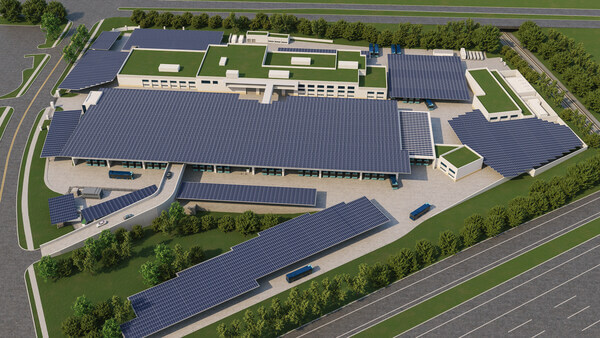AlphaStruxure and Maryland’s Montgomery County officials have broken ground on an integrated microgrid infrastructure project. The project will feature electric bus charging and on-site green hydrogen production powered by solar and battery energy storage.
The county operates the second-largest bus fleet in the Washington, D.C., region. Its David F. Bone Equipment Maintenance and Transit Operations Center is a major depot within Ride On Montgomery’s network and the fifth-largest county-owned energy consumer. By 2035, the depot is projected to accommodate 200 zero-emissions buses, most of which will be hydrogen fuel cell electric buses (FCEBs). The county is using FCEBs in part because they have a greater range than battery electric buses and can thus support longer bus routes. A hydrogen FCEB is a zero-emissions vehicle, powered by hydrogen and oxygen, emitting only water.
Construction of the microgrid is expected to be completed in 2025, when the system will begin sending renewable energy back to the grid and be able to power zero-emissions buses. This microgrid follows the launch of the Brookville Smart Energy Bus Depot in 2022, which was the county’s first fully constructed microgrid-powered bus depot and also led by AlphaStruxure. Together, the two depots will eventually power about 335 zero-emissions transit buses, according to the county’s latest fleet transition plan.
“It’s a joyous moment to be breaking ground on a project that is the new standard for public transit in the United States,” says Juan Macias, CEO of AlphaStruxure. “The county has proven itself as a national leader in zero-emissions transit, in part by prioritizing simultaneous procurement of both the buses and the sustainable infrastructure needed to power them.”
Fueling the county’s FCEBs with green hydrogen produced by the microgrid’s solar array advances the county’s goal of reaching a 100% reduction in carbon emissions by 2035. The microgrid also enables the county to reduce its Scope 1 and 2 emissions by 4,000 metric tons of CO2 per year, equivalent to the annual electricity usage of about 780 homes. The county will also use the microgrid to advance equity. The microgrid will support zero-emissions buses for cleaner air and less congestion along its bus rapid transit network, which serves many minority and low-income riders. It will also support new career and training opportunities for underserved communities through a county apprenticeship program.
Like the Brookville depot, this existing depot will remain fully operational throughout its 28-phase construction process, with no impact on transit services. The microgrid will provide sustainable, resilient power to a mixed fleet of battery electric vehicles and FCEBs, along with the facility’s five buildings. It will also be interconnected to the Pepco utility grid and is engineered to operate in island mode indefinitely, ensuring uninterrupted service for the county’s constituents.
A joint venture of Carlyle and Schneider Electric, AlphaStruxure will finance the project through the EaaS business model. The Boston-based company will deliver all aspects of design, construction, and long-term operations and maintenance.
Montgomery County’s Department of General Services, Department of Transportation, and Office of Energy and Sustainability are spearheading this drive toward achieving net-zero emissions by leading the transition of the county’s transit fleet and depot infrastructure.
AlphaStruxure’s partners for this project include Mortenson for design-build; Schneider Electric for the battery energy storage system, microgrid controls, switchgear and services; WSP as the engineer of record; AZZO for network and cybersecurity; The Mobility House for charge management software; and Heliox for EV charger hardware.





